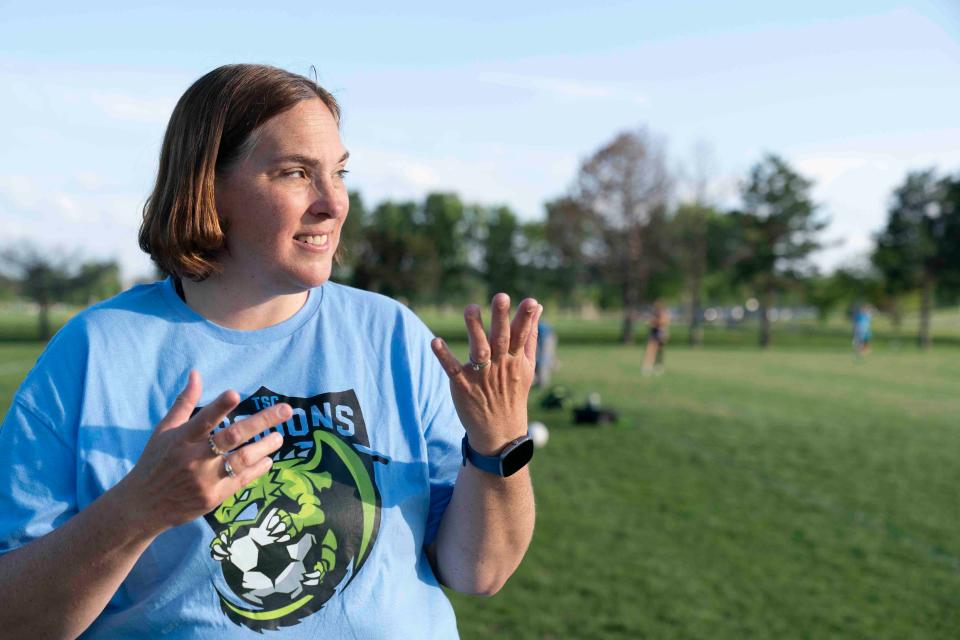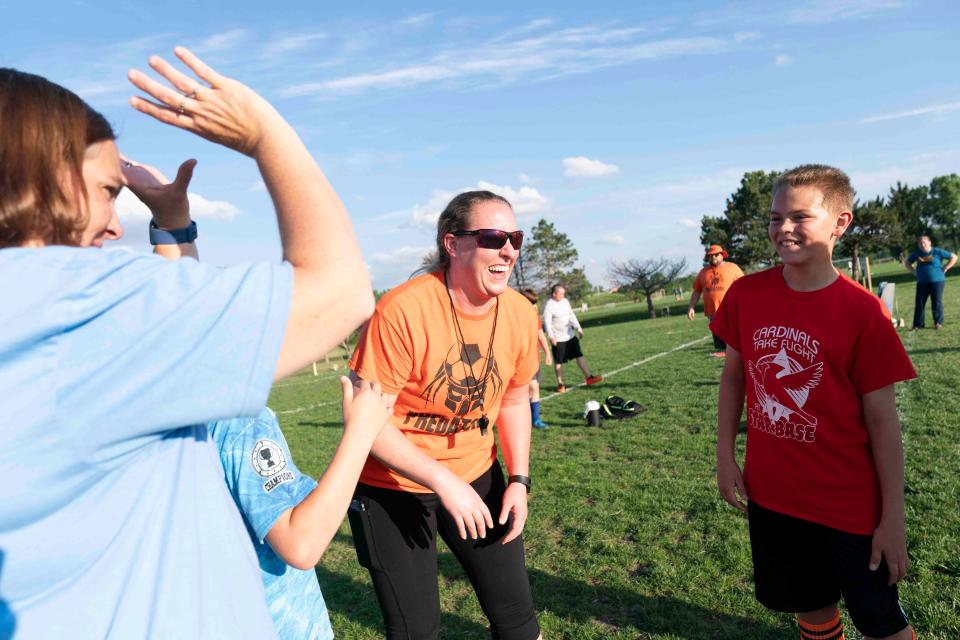How Topeka woman shares importance of language access through advocacy and free ASL classes
What began as a way for one woman to meet new people when she moved to town became a launching pad for visibility and inclusion in the deaf community.
Sara Hale has been increasing communication access in Topeka by offering free American Sign Language (ASL) classes at Faith Lutheran Church at 1716 S.W. Gage Boulevard for more than 15 years. She also advocates for inclusive policies for deaf and hard-of-hearing citizens at the state level.
“I started with wanting a way for meeting members at Faith when I moved to Topeka after getting married,” said Hale. “It grew from there and became a way for me to educate families and teachers of deaf and hard-of-hearing children.”
Hale said many parents who learn their newborn or child failed a hearing test are initially scared and overwhelmed. Doctors bombard them with information, and Hale said sometimes the information they receive isn't accurate.
“I use that time to tell them it’s OK to use sign language with their babies, and they will succeed,” she said.

Advocate learned sign language from the time she was an infant
Hale, who grew up with deaf parents, said she feels fortunate that she had the benefit of language through ASL from day one as a deaf child. Her husband and two of her four children are also deaf, and the entire family is fluent in ASL.
She shares the importance of language access with others on a regular basis.
“I use my deaf sons as an example and say they are thriving in school because they had language from day one," Hale said. "When you sign with your baby, their world will open up.”
Robert Cooper, director for the Kansas Commission of the Deaf and Hard of Hearing, praised Hale’s efforts in bringing resources to an underserved area of the state.
“There’s a strong need because there are fewer interpreters in Topeka than there are in Kansas City or Lawrence,” said Cooper. “Forty years ago, Topeka had a lot of deaf people because of state jobs. Now there are only a few. People move in, and then they realize there aren’t enough interpreters, so they move out.”
He said the more people in a community who are familiar with ASL, the more friendly and accepting a town feels to prospective deaf residents. Cooper encourages hearing community members to learn ASL alongside their deaf and hard-of-hearing neighbors.
“When there aren’t enough resources or services, it becomes even more important for people among the general public to know sign language. Most deaf people are very friendly, but they don’t have the opportunity to socialize. Having others in the community learning ASL gives them a wider opportunity to socialize with other people.”
A little bit of sign language can go a long way, expert says
Cooper said learning ASL can also be beneficial for people who experience hearing loss later in their lives.
“Community members who have heard their entire lives may suddenly experience hearing loss, which can be very isolating," he said. "A deaf person who may feel frustrated with everyday life can communicate with others. It seems simple, but it’s a really big deal. ASL is the key to helping people connect with others.”
Cooper said seeing people in the community who are open to learning ASL or attempting to do so provides a welcoming environment, even when the person learning may feel awkward or unsure of their communication skills at first.
“People don’t even have to become fully fluent to use ASL," he said. "You don’t have to use Spanish fluently, but you can still relate to other people and make connections when you know a little bit.”
He said classes and programs like Hale’s should be a model for other groups statewide to help increase accessibility to ASL, especially in parts of Kansas where resources are lacking.
“It’s very important to have resources here instead of far away. We have technology to help now, but it’s better to learn ASL in person,” said Cooper. “Sign includes touch and feeling, and it’s hard to pick up touch from a screen, especially for babies and young children learning language.
"It’s also a wonderful opportunity for parents to meet other deaf people, see that they hold down jobs, lead successful lives, and are fulfilling their dreams, and to see that there are many different options to communicate with their child.”

Free classes to learn sign language are available in Topeka
Hale continues to work toward educating others about the importance of inclusion via language, something that she says can feel like an uphill battle at times.
“I am constantly teaching,” said Hale. “Even with modern technology, we still struggle. Not all places are willing to work with an interpreter or willing to pay for one.”
Hale said something as simple as making a phone call to her insurance company can be an exercise in frustration. Some businesses hesitate to communicate with her over the phone because she uses a relay service, which relies on an interpreter to relay her message to the recipient.
“Some days are frustrating and hard, and it helps remind me that educating people is important. One day we will live in a society where it’s so normal, and we don’t have to continually fight for our rights to communication access,” she said.
Hale is leading the charge by continuing to offer free ASL classes to anyone interested in learning. The next round of classes will begin in the fall at Faith Lutheran Church. Class information, dates, and times will be posted on the church website and Facebook page.
She encourages anyone interested in learning ASL to attend and starting building communication bridges in the wider Topeka community.
“ASL is one of the top three languages in the U.S., so the chances of you seeing deaf or hard-of-hearing people chatting in sign language is likely,” she said. “My favorite story is how a little boy who wanted to play with my deaf son forced his family to learn (ASL) so they could hang out and play together.
"From there, a strong bond was formed, and we are all great friends.”
This article originally appeared on Topeka Capital-Journal: Topeka woman advocates for language access and gives free ASL classes

